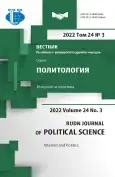The “Moscow Case” as a Factor of Protest Communication Activity in the Social Network “VK”
- Авторлар: Philippov I.B.1
-
Мекемелер:
- National Research University “Higher School of Economics”
- Шығарылым: Том 24, № 3 (2022): Internet and Politics
- Беттер: 530-544
- Бөлім: POLITICAL POLARIZATION AND INTERNET PROTEST
- URL: https://journal-vniispk.ru/2313-1438/article/view/322617
- DOI: https://doi.org/10.22363/2313-1438-2022-24-3-530-544
- ID: 322617
Дәйексөз келтіру
Толық мәтін
Аннотация
This paper addresses the impact of negative juridical sanctions implemented against the participants of the 2019 protest movement in Moscow on the communication in the social network “VK”. The empirical analysis of the mentions of protests and juridical prosecutions allowed to estimate the volume of discussions about the negative sanctions, to compare it with the discussions around the protest rallies and to outline the main factors affecting how active the discussion is on different episodes of negative sanctions. The results show that the coverage of the criminal persecution of activists provokes substantively less interest among the authors and the readers than the communication on the protest movement itself. Increased activity in comments is not observed, while the communication is concentrated in large communities. The input in the protest communication was not the same for sanctions against different activists: the impact was more notable when the media campaign in defense of the accused managed to involve persons with high media capital or a considerable number of people outside the protest movement. In the cases when the events around the accused were only relevant for other activists the surge in online communication turned out to be less noticeable. This implies that negative juridical sanctions are not a newsbreak themselves but have the potential to provoke an outburst in protest communication if the coverage is complemented by the traditional forms of political mobilization or includes opinion leaders.
Авторлар туралы
Ilya Philippov
National Research University “Higher School of Economics”
Хат алмасуға жауапты Автор.
Email: ibfilippov@gmail.com
ORCID iD: 0000-0002-1464-2923
postgraduate in the PhD School of Political Science
Moscow, Russian FederationӘдебиет тізімі
- Akhremenko, A., & Philippov, I. (2019). Impact of the violent suppression of protest on its discussion in social networks. Monitoring of Public Opinion: Economic and Social Changes, 153(5). 200–225. https://doi.org/10.14515/monitoring.2019.5.10 (In Russian).
- Arkhipova, A., Radchenko, D., Titkov, A., Kozlova, I., Iugai, E., Belianin, S., & Gavrilova, M. (2018). «Rally rebuild»: Internet in protest and protest on the Internet. Monitoring of Public Opinion: Economic and Social Changes, 143(1), 12–35. https://doi.org/10.14515/monitoring.2018.1.02 (In Russian).
- Barkan, S. (2006). Criminal prosecution and the legal control of protest. Mobilization: An International Quarterly, 11(2), 181–194. https://doi.org/10.17813/maiq.11.2. a8671t532kww2722
- Christensen, H.S. (2011). Political activities on the Internet: Slacktivism or political participation by other means? // First Monday, 16(2). https://doi.org/1010.5210/fm.v16i2.3336
- Della Porta, D. (2011). Communication in movement. Information, Communication & Society, 14(6), 800–819. https://doi.org/10.1080/1369118X.2011.560954
- Drury, J., & Reicher, S. (2000). Collective action and psychological change: The emergence of new social identities. British journal of social psychology, 39(4), 579–604. https://doi.org/10.1348/014466600164642
- Earl, J. (2015). The future of social movement organizations: The waning dominance of SMOs online. American Behavioral Scientist, 59(1), 35–52. https://doi.org/10.1177/0002764214540507
- Earl, J., & Soule, S. (2006). Seeing blue: A police-centered explanation of protest policing. Mobilization: An International Quarterly, 11(2), 145–164. https://doi.org/10.17813/ maiq.11.2.u1wj8w41n301627u
- Farrell, H. (2012). The consequences of the internet for politics. Annual review of political science, 15, 35–52. https://doi.org/10.1146/annurev-polisci-030810-110815
- Gerbaudo, P. (2020). The pandemic crowd. Journal of International Affairs, 73(2), 61–76.
- González-Bailón, S., Borge-Holthoefer, J., & Moreno, Y. (2013). Broadcasters and hidden influentials in online protest diffusion. American behavioral scientist, 57(7), 943–965. http://dx.doi.org/10.2139/ssrn.2017808
- Halupka, M. (2014). Clicktivism: A systematic heuristic. Policy & Internet, 6(2), 115–132. https://doi.org/10.1002/1944-2866.POI355
- Ismangil, M., & Lee, M. (2021). Protests in Hong Kong during the COVID-19 pandemic. Crime, Media, Culture, 17(1), 17–20. https://doi.org/10.1177/1741659020946229 Morozov, E. (2009). The brave new world of slacktivism. Foreign policy, 19(05).
- Nassauer, A. (2015). Effective crowd policing: empirical insights on avoiding protest violence. Policing: An International Journal of Police Strategies & Management, 38(1), 3–23. https://doi.org/10.1108/PIJPSM-06-2014-0065
- Nim, E. (2016). “I can haz toy protezt”: in search of a theory of social movement mediatisation. The Journal of Social Policy Studies, 14(1), 55–70. (In Russian).
- Peterson, A., & Wahlström, M. (2015). Repression: the governance of domestic dissent. The Oxford handbook of social movements, 634–652. https://doi.org/10.1093/ oxfordhb/9780199678402.013.2
- Poell, T., & van Dijck, J. (2018). Social Media and new protest movements. In J. Burgess, A. Marwick & T. Poell (Eds.), The SAGE Handbook of Social Media (pp. 546–561). London: Sage.
- Steinhoff, P.G. (Ed.). (2016). Going to court to change Japan: Social movements and the law in contemporary Japan. University of Michigan Press.
- Tanneberg, D. (2020). How to Measure Dictatorship, Dissent, and Political Repression. In The Politics of Repression Under Authoritarian Rule (pp. 43–75). Springer, Cham.
- Van Dijck, J., & Poell, T. (2013). Understanding social media logic. Media and communication, 1(1), 2–14. https://doi.org/10.12924/mac2013.01010002
- Wong, S.C., & Wright, S. (2020). Hybrid mediation opportunity structure? A case study of Hong Kong’s Anti-National Education Movement. New Media & Society, 22(10), 1741–1762. https://doi.org/10.1177/1461444819879509
Қосымша файлдар









